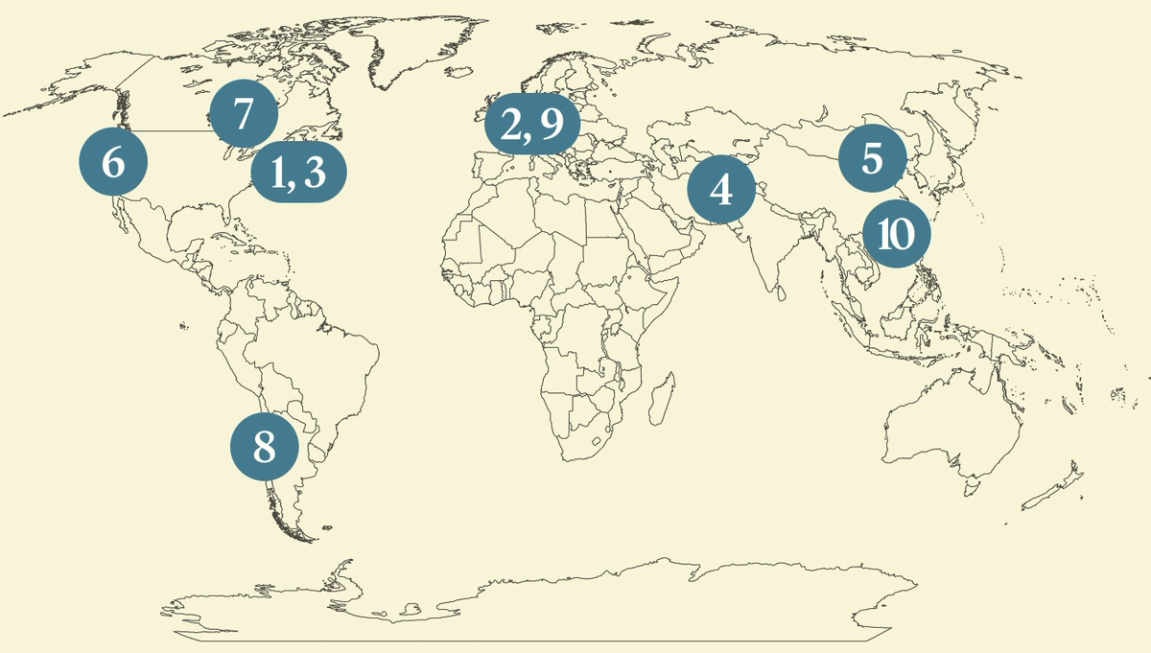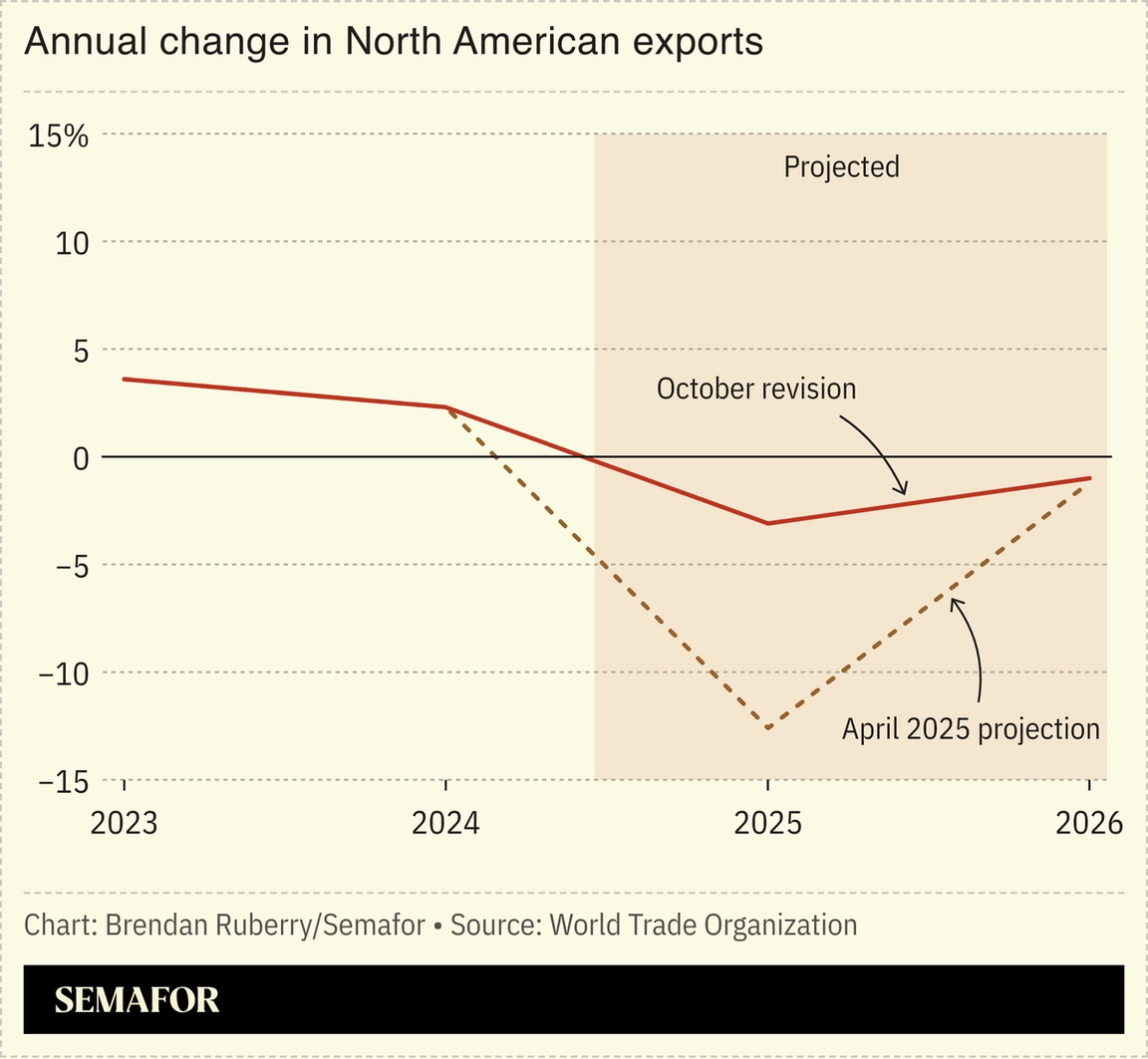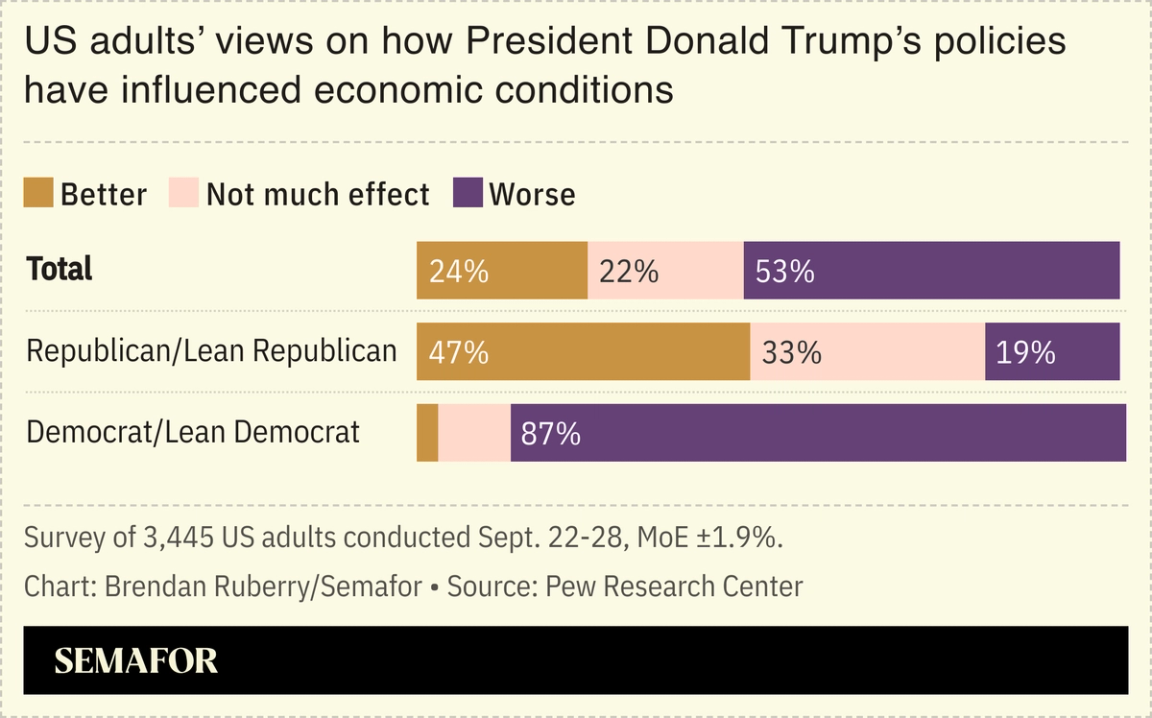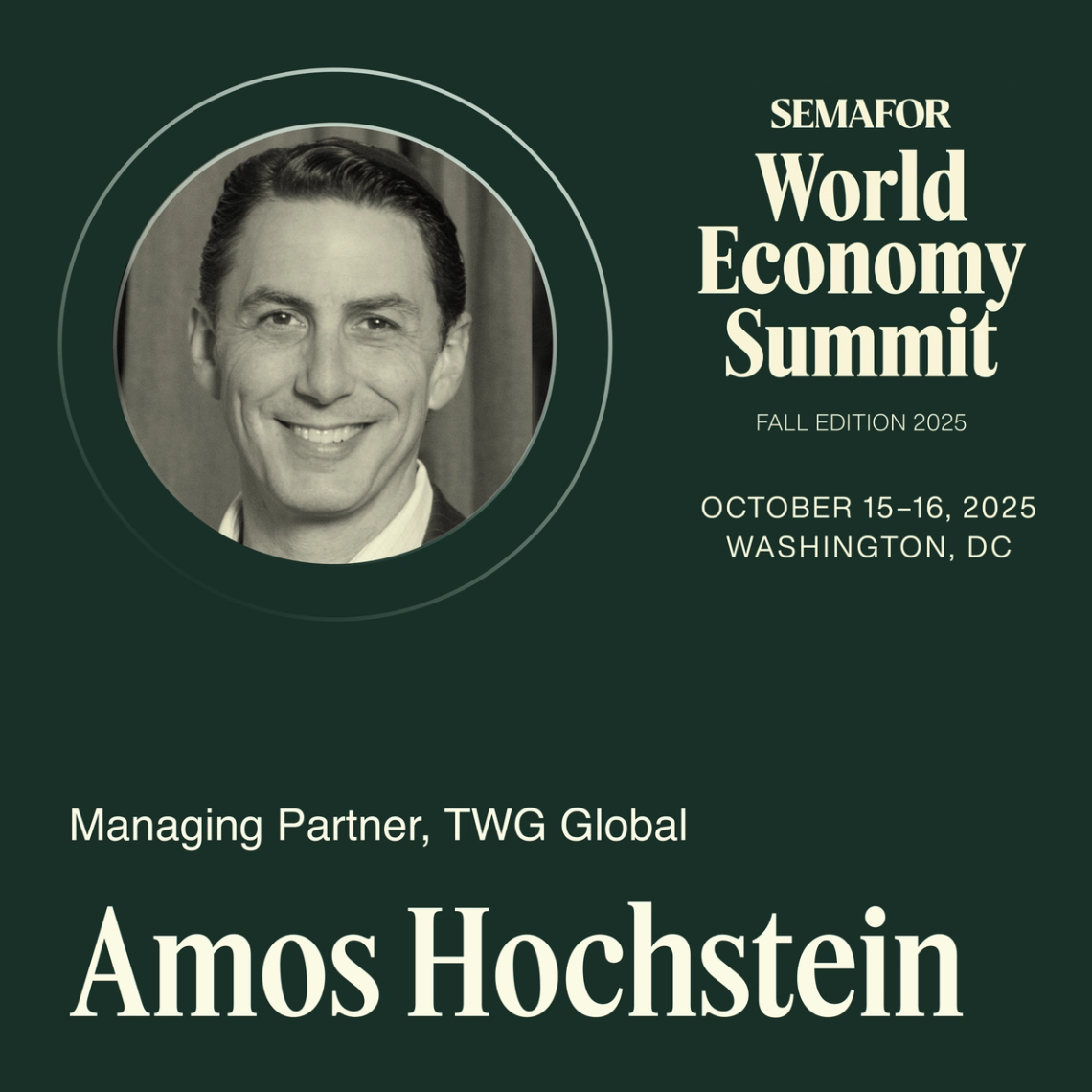| | The world economy is doing better than experts had feared, the Taliban’s foreign minister goes to In͏ ͏ ͏ ͏ ͏ ͏ |
| |   CIVITAVECCHIA CIVITAVECCHIA |   KABUL KABUL |   HONG KONG HONG KONG |
 | Flagship |  |
| |
|
The World Today |  - Economy ‘better than feared’
- Experts look in the mirror
- Lack of data clouds picture
- Taliban official in India
- China executives detained
- Shopping in its AI era
- Online platforms get worse
- Rogue planet grows
- Debate over meatless meat
- The world’s best bar
 A grave discovery in a New Orleans garden. |
|
Global economy ‘better than feared’ |
 Jonathan Ernst/Reuters Jonathan Ernst/ReutersThe global economy has held up “better than feared” despite tariff-induced turbulence, but risks remain, the head of the International Monetary Fund said Wednesday. Kristalina Georgieva said the US economy in particular has softened, but has avoided the recession that many feared earlier this year when President Donald Trump unveiled his steep import duties. Other global financial chiefs have similarly pointed to unexpected resilience, with nations skirting an escalating, tit-for-tat trade war that threatened to hobble markets. Still, uncertainty looms over the economy, which has performed “worse than we need… Buckle up,” Georgieva said. She cautioned about ballooning stocks on the back of AI optimism, stressing that a sharp correction threatens to drag down growth. |
|
How economists got it wrong |
 Economists are trying to reconcile reality with their previous pessimistic forecasts of a global slowdown as a result of tariffs. Analysts “need to look ourselves in the mirror,” Apollo’s chief economist wrote. “It is becoming increasingly difficult to argue that we are still waiting for the delayed negative effects” of US President Donald Trump’s “Liberation Day” duties. Economists wrongly predicted other nations would retaliate, while in reality only China and Canada have hit back, a CSIS expert wrote. Many also thought businesses would pass tariffs on to consumers — but manufacturers have largely hesitated to do so. Economists should spend less time “perfecting equations for imaginary rational actors,” a London-based analyst wrote, “and more time observing how real people behave.” |
|
Poor data further hampers forecasts |
 A lack of official, reliable data makes future global economic projections ever more difficult, experts said. The US government shutdown is forcing analysts, investors, and policymakers to rely on unofficial reports compiled by businesses, which so far have pointed to a weakening job market. Even government job numbers, however, drew scrutiny earlier this year after making steep revisions. The granularity of official data has also declined, “threatening the depth of insights available to policymakers and the public,” a former US labor official said in a recent Goldman Sachs report. The concerns aren’t limited to Washington: The UK’s statistics office has made several errors in data releases this year. Most recently it found a missing $4 billion in tax receipts. |
|
 Amos Hochstein, Managing Partner, TWG Global, will join the stage at the Fall Edition of Semafor’s World Economy Summit. Hosted in the Gallup Great Hall and spanning eight sessions over two days, the summit will feature on-the-record interviews on the state of global growth and finance, AI advancements, powering global energy needs, and the forces reshaping the world economy. Each session brings together the leaders and forces most directly shaping the global economy, with programming powered by Semafor’s world-class editorial and executive leadership.
|
|
Taliban minister visiting India |
 Ali Khara/Reuters Ali Khara/ReutersThe Taliban foreign minister’s visit to India starting Thursday reflects a shift in New Delhi’s posture toward Afghanistan, as other regional powers also look to grow their influence in Kabul. India does not officially recognize the Taliban, but the thawing ties could be a response to China’s efforts to mend relations between Afghanistan and Pakistan, analysts said. For the Taliban, the visit projects “legitimacy for their domestic constituents,” and signals they are no longer over-dependent on Islamabad, experts wrote in NDTV. The Taliban is pushing for more international acceptance — Russia recently became the first country to formally recognize its government, and other nations, including in Central Asia, could soon follow suit. |
|
China targets more executives |
 Hector Retamal/AFP via Getty Images Hector Retamal/AFP via Getty ImagesChina is quietly investigating and detaining executives in the country as part of a ballooning corruption crackdown, The Economist wrote. Authorities have gone after dozens of bosses at publicly listed companies — and likely more at private firms — this year through the liuzhi system, in which detainees’ rights are restricted and targets can be held for months without court approval. While global attention has focused on foreign business sentiment toward operating in China, the detentions are contributing to a worsening corporate atmosphere among Chinese companies. Fear of being added to a credit blacklist “is real,” The Economist wrote, “and may lead companies to take fewer risks.” |
|
 Charles Platiau/Reuters Charles Platiau/ReutersAI-powered shopping is predicted to jump sixfold during this year’s Western holiday season. An Adobe Analytics survey found that 53% of US consumers may use AI for researching gifts, sourcing recommendations, and finding Black Friday deals. Adobe also found that AI traffic to retail sites jumped 1,300% in 2024. The move to rely on AI to find gifts could influence our choices — and not necessarily for the better. When Google Maps became popular, it started sending lots of cars down previously quiet side streets. Perhaps AI will similarly recommend that everyone buy the same Cinnamoroll plushies or Swiss Army Knives for their loved ones. |
|
From good to bad: The internet lifecycle |
 MCD MCDOnline platforms go through a predictable lifecycle, from being useful to being useless, a veteran tech writer argued. In 2022, Cory Doctorow coined the term “enshittification” to describe this cycle: Platforms start out being good to users, but eventually start taking advantage of them, and eventually become a “pile of shit” in the process, he wrote in The Guardian. Amazon, for example, went from providing an excellent shopping service in its early years, he said, to being flooded with low-quality, high-priced junk; Facebook users, meanwhile, must “scroll past 10 screens of engagement-bait, AI slop and surveillance ads” to read their friends’ posts. Doctorow’s neologism went viral, and now captures the vibe of our era, The New Yorker wrote. |
|
Rogue planet breaks records |
 Artist rendering of Cha 1107-7626. European Southern Observatory/YouTube Artist rendering of Cha 1107-7626. European Southern Observatory/YouTubeAstronomers observed a rogue planet go through a record-breaking growth spurt, providing new clues about these bizarre objects. Rogue planets are worlds without a host star, moving through space alone. This particular loner, Cha 1107-7626, is a gas giant estimated to be between five and 10 times the mass of Jupiter. Researchers at an observatory in Chile noticed that the planet was consuming its accretion disk — an orbiting cloud of dust and gas — far faster than it had just a month earlier, putting away as much as 6 billion tons of matter per second. The findings suggest that these planets may behave similarly to stars, perhaps even forming their own mini solar systems, a researcher told The Wall Street Journal. |
|
EU meat producers fight back |
 Siphiwe Sibeko/Reuters Siphiwe Sibeko/ReutersThe European Parliament voted to restrict the use of words such as “steak,” “burger,” or “sausage” to describe only meat products. Meat consumption in the EU is down, thanks to high costs and concern over animal welfare and meat’s environmental impact, while plant-based alternatives are on the rise. German producers made 126,500 tons of alternative meat products last year, more than double the 2020 figure. But a growing backlash from meat producers is influencing politicians worldwide. Several US states have banned lab-grown meat, while the German chancellor this week declared “sausage is not vegan.” Linguists may differ: The terms “veggie burger” and “veggie sausage” have been widely used since the 1980s. |
|
Hong Kong bar named world’s best |
|
|